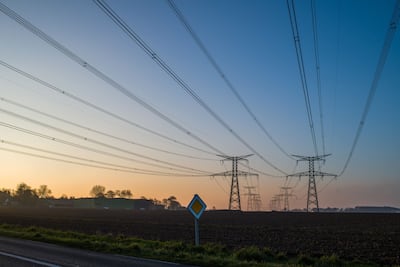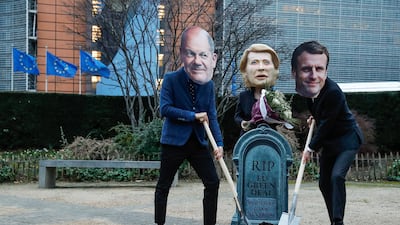The EU’s executive branch will press ahead with plans to classify gas and nuclear power as climate-friendly despite protests from environment campaigners and member states including Germany and Austria.
In a victory for pro-nuclear countries such as France, the European Commission announced that the two power sources would be included in a menu of green investments for the private sector.
Mairead McGuinness, the commissioner for financial services, said the urgent need to scrap coal power meant accepting “imperfect solutions” until Europe can get more of its power from renewable sources.
“I believe that we have found a balance between fundamentally different opinions in supporting the road to decarbonisation,” she said after the 27-member commission approved the proposals on Wednesday.
They were presented in draft form on January 1, beginning a month-long consultation in which Germany and others lodged objections.
Ms McGuinness said the green list known as the EU taxonomy was a tool of financial policy, meant to steer private investment towards green activities, and did not force anyone to use or invest in nuclear or gas.
But critics said the taxonomy undermines the EU’s credibility in climate policy and constitutes an act of greenwashing, or passing off polluting activities as environmentally friendly.
Although nuclear power produces minimal carbon emissions, it is controversial because of the waste it produces and the risk of an accident. Gas-fired plants emit carbon dioxide, although they are regarded as less harmful than coal.
Protesters at commission headquarters staged a mock burial for the EU’s so-called Green Deal agenda on Wednesday, saying the plan to become the first climate-neutral continent by 2050 is weakened by political horse-trading.
"I’d like to report an attempted robbery, please," joked Greenpeace campaigner Ariadna Rodrigo. "Someone is trying to take billions of euros away from renewables and sink them into technologies that either do nothing to fight the climate crisis, like nuclear, or which actively make the problem worse."
'Back room deal'
The inclusion of both nuclear and gas was seen as a potential compromise between atomic power reliant France and its neighbour Germany, which is on the brink of abolishing nuclear power but will need gas to fill the gap.
“A trustworthy taxonomy requires science as its basis, not back room doors between a few EU leaders,” said Paul Tang, a Dutch member of an economic affairs committee in the European Parliament.
“For a global leader in the fight against climate change, labelling fossil gas and nuclear as sustainable is a strange hill to die on”.
Markus Ferber, a German MEP, said the commission had failed to listen to its critics during a four-week consultation.
Criticism from countries such as Germany, Austria and Luxembourg “has not been heard by the European Commission”, he said.

Ms McGuinness said technical adjustments had been made in response to feedback, including amendments to the rules for gas and nuclear to qualify for the green list.
Gas-fired plants will be subject to emissions caps, they should replace an existing coal facility and should be aiming to switch to low-carbon energy sources by 2035.
Investment in nuclear plants can include upgrades to reactors, but will have to meet what the commission described as comprehensive safety and waste requirements.
Parliament clash
Opponents have four months to move against the plans with a vote in the European Council or Parliament, but they do not have the required majority in the first and the picture in the second is uncertain.
Esther de Lange, a climate spokeswoman for the largest bloc in the Parliament, faulted the commission for failing to consult MEPs but said the taxonomy offered “much-needed clarity”.
“To reduce Europe's CO2 emissions, we need gas. Not for ever and everywhere, but for a transitional period and in certain situations,” she said.
Austria separately plans to file a lawsuit against the plans, although Germany said that it regards the prospects for a successful legal challenge as poor.
An earlier section of the taxonomy, which gives the green badge to less controversial energy sources, is already in force.
It does not require companies to choose climate-friendly investments, but aims to give a definitive measure of their environmental impact – after the Cop26 summit brought promises from the private sector to act climate-consciously.
Ms McGuinness said the transitional use of gas and nuclear was necessary in part because 15 per cent of electricity production in Europe still relies on coal.
“Today is a means to an end. The end is a low-carbon future powered by renewable energy,” she said.
“We need to move as fast as we can from the highest-carbon energy sources like coal. During this transition, that may mean accepting imperfect solutions.”


